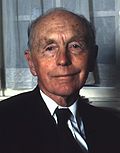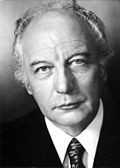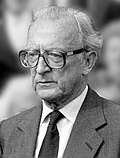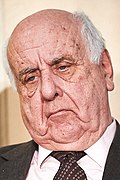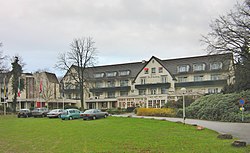 Bilderberg Hotel in the Netherlands, eponymous location of the first conference in 1954 51°59′23″N 5°49′03″E / 51.9898°N 5.8176°E / 51.9898; 5.8176 Bilderberg Hotel in the Netherlands, eponymous location of the first conference in 1954 51°59′23″N 5°49′03″E / 51.9898°N 5.8176°E / 51.9898; 5.8176 | |
| Formation | 29 May 1954; 70 years ago (1954-05-29) |
|---|---|
| Membership | c. 150 invitees, smaller core group |
| Co-Chair of the Steering Committee | Marie-Josée Kravis |
| Website | bilderbergmeetings |
The Bilderberg Meeting (also known as the "Bilderberg Group", "Bilderberg Conference" or "Bilderberg Club") is an annual off-the-record forum established in 1954 to foster dialogue between Europe and North America. The group's agenda, originally to prevent another world war, is now defined as bolstering a consensus around free market Western capitalism and its interests around the globe. Participants include political leaders, experts, captains of industry, finance, academia, numbering between 120 and 150. Attendees are entitled to use information gained at meetings, but not attribute it to a named speaker (known as the Chatham House Rule). The group states that the purpose of this is to encourage candid debate while at the same time maintaining privacy, but critics from a wide range of viewpoints have called it into question, and it has provoked conspiracy theories from both the left and right.
Meetings were chaired by Prince Bernhard of the Netherlands until 1975. The current Chairman is French businessman Henri de Castries. Since 1954, the meeting has taken place every year except in 1976, when it was cancelled due to the Lockheed bribery scandals involving Prince Bernhard, and in 2020 and 2021 due to the COVID-19 pandemic. Lisbon hosted the 69th meeting in 2023.
Origin
Main article: 1954 Bilderberg ConferenceThe first conference was held at the Bilderberg Hotel (Hotel de Bilderberg) in Oosterbeek, Netherlands, from 29 to 31 May 1954. The hotel gave its name both to the group and to the "Bilderbergers" who participate in its activities. The hotel is situated in a quiet location, approximately 7 km west of the city of Arnhem. It is owned and operated by the Bilderberg hotel chain, which runs 12 hotels and an event location in the Netherlands and one hotel in Germany. At the time of the 1954 conference, it was a medium-sized family-run hotel.
The conference was initiated by several people, including Polish politician-in-exile Józef Retinger who, concerned about the growth of anti-Americanism in Western Europe, proposed an international conference at which leaders from European countries and the United States would be brought together with the aim of promoting Atlanticism—better understanding between the cultures of the United States and Western Europe to foster cooperation on political, economic, and defense issues.
Retinger approached Prince Bernhard of the Netherlands who agreed to promote the idea, together with former Belgian prime minister Paul van Zeeland, and the then head of Unilever, Paul Rijkens. Bernhard in turn contacted Walter Bedell Smith, the then head of the CIA, who asked Eisenhower adviser Charles Douglas Jackson to deal with the suggestion. The guest list was to be drawn up by inviting two attendees from each nation, one of each to represent "conservative" and "liberal" points of view. Fifty delegates from 11 countries in Western Europe attended the first conference, along with 11 Americans.
The success of the meeting led the organizers to arrange an annual conference. A permanent steering committee was established with Retinger appointed as permanent secretary. As well as organizing the conference, the steering committee also maintained a register of attendee names and contact details with the aim of creating an informal network of individuals who could call upon one another in a private capacity. Conferences were held in France, Germany, and Denmark over the following three years. In 1957, the first U.S. conference was held on St. Simons Island, Georgia, with $30,000 from the Ford Foundation. The foundation also supplied funding for the 1959 and 1963 conferences.
Participants
Main article: List of Bilderberg participantsThe participants are between 120 and 150 people, including political leaders, experts from industry, finance, NATO, academia and the media. About two thirds of the participants come from Europe and the rest from North America; one third from politics and government and the rest from other fields. Historically, attendee lists have been weighted toward bankers, politicians, directors of large businesses and board members from large publicly traded corporations, including Wallenberg-owned conglomerate holding company Investor AB and other Wallenberg-owned multinationals such as Ericsson and ABB, IBM, Xerox, Royal Dutch Shell, Nokia and Daimler. Heads of state, including former King Juan Carlos I of Spain and former Queen Beatrix of the Netherlands, have attended meetings. A source connected to the group told The Daily Telegraph in 2013 that other individuals, whose names are not publicly issued, sometimes turn up "just for the day" at the group's meetings.
The banker and industrialist Marcus Wallenberg Jr. was a member of the steering committee and attended the meeting twenty-two times from the 1950s to 1981, a year prior to his death. His grandson Marcus Wallenberg has attended it eight times and his other grandson, Jacob Wallenberg, seventeen times.
Meetings
Further information: List of Bilderberg meetingsActivities and goals
The group's original goal of promoting Atlanticism, strengthening U.S.-European relations, and preventing another world war has grown. According to Andrew Kakabadse, the Bilderberg Group's theme is to "bolster a consensus around free-market Western capitalism and its interests around the globe". In 2001, Denis Healey, a Bilderberg group founder and a steering committee member for 30 years, said, "To say we were striving for a one-world government is exaggerated, but not wholly unfair. Those of us in Bilderberg felt we couldn't go on forever fighting one another for nothing and killing people and rendering millions homeless. So we felt that a single community throughout the world would be a good thing."
According to the web page of the group, the meetings are conducted under the Chatham House Rule, allowing the participants to use any information they gained during the meeting, but not to disclose the names of the speakers or any other participants. According to former chairman Étienne Davignon in 2011, a major attraction of Bilderberg group meetings is that they provide an opportunity for participants to speak and debate candidly and to find out what major figures really think, without the risk of off-the-cuff comments becoming fodder for controversy in the media. A 2008 press release from the "American Friends of Bilderberg" stated that "Bilderberg's only activity is its annual Conference and that at the meetings, no resolutions were proposed, no votes taken, and no policy statements issued." However, in November 2009, the group hosted a dinner meeting at the Château of Val-Duchesse in Brussels outside its annual conference to promote the candidacy of Herman Van Rompuy for President of the European Council.
Organizational structure
Meetings are organized by a steering committee with two members from each of approximately 18 nations. Official posts include a chairman and an Honorary Secretary General. The group's rules do not contain a membership category but former participants receive the annual conference reports. The only category that exists is "member of the steering committee". Besides the committee, there is a separate advisory group with overlapping membership.
Dutch economist Ernst van der Beugel became permanent secretary in 1960, upon Retinger's death. Prince Bernhard continued to serve as the meeting's chairman until 1976, the year of his involvement in the Lockheed affair. The position of Honorary American Secretary General has been held successively by Joseph E. Johnson of the Carnegie Endowment; William Bundy of Princeton University; Theodore L. Eliot Jr., former U.S. ambassador to Afghanistan; and Casimir A. Yost of Georgetown University's Institute for the Study of Diplomacy.
According to James A. Bill, the "steering committee usually met twice a year to plan programs and to discuss the participant list".
In 2002, in Them: Adventures with Extremists, author Jon Ronson wrote that the group has a small central office in Holland which each year decides what country will host the forthcoming meeting. The host country then has to book an entire hotel for four days, plus arrange catering, transport and security. To fund this, the host solicits donations from sympathetic corporations such as Barclays, Fiat Automobiles, GlaxoSmithKline, Heinz, Nokia and Xerox.
Chairmen of the Steering Committee
Criticism
There have been long standing concerns about lobbying, since senior policymakers meet with corporate lobbyists, and in the case of the 2015 meeting even with senior figures at Transparency International.
Partly because of its working methods to ensure strict privacy and secrecy, the Bilderberg Group has been criticised for its lack of transparency and accountability. Ian Richardson sees Bilderberg as the transnational power elite, "an integral, and to some extent critical, part of the existing system of global governance", that is "not acting in the interests of the whole". Many of these critics have emphasized that they do not accept or do not believe that there is enough evidence to support the diversity of conspiracy theories that have arisen in regard to the group and that they disapprove of what they regard as their unpleasant associations and connotations. For example, an article by the English commentator Charlie Skelton in The Guardian in June 2017 criticized the world view expressed in an agenda published by the Bilderberg group without engaging in speculation about conspiratorial activities.
Conspiracy theories
The secrecy of the proceedings has led not only to varied criticism of the group and its activities from across the political spectrum but also to a number of conspiracy theories, which have grown especially popular within certain political movements, although the different factions of theorists often disagree about the exact nature of the group's intentions and use different sources and levels of evidentiary rigor to back up their conjectures. Some on the left, or of less specific political affiliations, accuse the Bilderberg group either of covertly imposing or generally propping up capitalist domination and corporate power, while some on the right have accused the group of imposing or helping to prepare the way for a world government and a global planned economy. The right-wing theorists tend to treat the group as the central directorate or planning arm of the conspiracy or at least attribute considerable importance to its role, whereas most of the left-wing and more loosely-affiliated or apolitical theorists treat it as just one of a set of institutions that help to advance international corporate interests and ideology.
In 2005, Davignon discussed accusations of the group striving for a one-world government with the BBC: "It is unavoidable and it doesn't matter. There will always be people who believe in conspiracies but things happen in a much more incoherent fashion. ... When people say this is a secret government of the world I say that if we were a secret government of the world we should be bloody ashamed of ourselves."
In a 1994 report, Right Woos Left, published by the Political Research Associates, investigative journalist Chip Berlet argued that right-wing populist conspiracy theories about the Bilderberg group date back to as early as 1964 and can be found in Phyllis Schlafly's self-published book A Choice, Not an Echo, which promoted a conspiracy theory in which the Republican Party was secretly controlled by elitist intellectuals dominated by members of the Bilderberg group, whose internationalist policies would pave the way for world communism.
In August 2010, former Cuban president Fidel Castro wrote an article for the Cuban Communist Party newspaper Granma in which he cited Daniel Estulin's 2006 book The Secrets of the Bilderberg Club, which, as quoted by Castro, describes "sinister cliques and the Bilderberg lobbyists" manipulating the public "to install a world government that knows no borders and is not accountable to anyone but its own self."
Proponents of Bilderberg conspiracy theories in the United States include such groups and individuals such as the John Birch Society, political activist Phyllis Schlafly, writer Jim Tucker, political activist Lyndon LaRouche, conspiracy theorist Alex Jones, and politician Jesse Ventura, who made the Bilderberg group a topic of a 2009 episode of his TruTV series Conspiracy Theory with Jesse Ventura. Although conspiracy theories about the Bilderberg Group have gained the most widespread credence by far in the United States, some high-profile non-American proponents have raised them as well, including Lithuanian writer Daniel Estulin and British politician Nigel Farage.
See also
- Bohemian Club
- Le Cercle
- Transnational capitalist class
- Trilateral Commission
- Valdai Discussion Club
- World Economic Forum
References
- "U.S. to Urge Pact in U.N. to Combat Business Bribes". The New York Times. 6 March 1976. ISSN 0362-4331. Retrieved 8 June 2022.
- Skelton, Charlie (4 June 2022). "Bilderberg reconvenes in person after two-year pandemic gap". the Guardian. Retrieved 26 April 2023.
- "Press release 2023".
- Atlas Obscura, "Hotel de Bilderberg"
- ^ "Bilderberg mystery: Why do people believe in cabals?". BBC News. 7 June 2011. Archived from the original on 10 June 2011. Retrieved 14 June 2011.
- ^ Gijswijt, Thomas, W., Informal Alliance: The Bilderberg Group and Transatlantic Relations during the Cold War, 1952–1968 (2018), Routledge. "The Hotel de Bilderberg was a medium-sized family-run hotel, chosen mainly for its quiet and remote location in the forests of the eastern Netherlands. It was not a particularly fancy hotel...but security was relatively easy to maintain since there was only one access road."
- Bilderberg hotels
- ^ "About Bilderberg Meetings". Bilderberg Meetings the Official Website. Archived from the original on 17 April 2020. Retrieved 12 July 2018.
- ^ Hatch, Alden (1962). "The Hôtel de Bilderberg". HRH Prince Bernhard of the Netherlands: An authorized biography. London: Harrap. OCLC 2359663.
The idea was to get two people from each country who would give the conservative and liberal slant
- "Japan–US Relations – Past, Present and Future". Daily Yomiuri. 8 December 1991.
Rockefeller: The idea (of creating the Trilateral Commission) was incorporated in a speech that I made in the spring of 1972 for the benefit of some industrial forums that the Chase held in different cities around Europe, … Then Zbig (Zbig Brzezinski) and I both attended a meeting of the Bilderberg Group … and was shot down in flames. There was very little enthusiasm for the idea. I think they felt that they had a very congenial group, and they didn't want to have it interfered with by another element that would—I don't know what they thought, but in any case, they were not in favor.
- ^ Aubourg, Valerie (June 2003). "Organizing Atlanticism: the Bilderberg Group and the Atlantic Institute 1952–63". Intelligence & National Security. 18 (2): 92–105. doi:10.1080/02684520412331306760. S2CID 153892953.
- ^ Rockefeller, David (2002). Memoirs. New York: Random House. p. 412. ISBN 978-0679405887.
- Hatch, Alden (1962). "The Hôtel de Bilderberg". HRH Prince Bernhard of the Netherlands: An authorized biography. London: Harrap. OCLC 2359663.
anybody who has ever been to a Bilderberg Conference should be able to feel that he can, in a private capacity, call on any former member he has met
- Moorehead, Caroline (18 April 1977). "An exclusive club, perhaps without power, but certainly with influence: The Bilderberg group". The Times. London.
- ^ "Bilderberg Meeting of 1997 Assembles" (Press release). PR Newswire. 13 June 1997. Archived from the original on 30 April 2011.
- Oliver, Mark (4 June 2004). "The Bilderberg group". The Guardian. London.
- "Bilderberg Group? No conspiracy, just the most influential group in the world". The Daily Telegraph (London). 6 June 2013. Retrieved 6 June 2013.
- Karl, Hellberg (11 August 2018). "Bilderberggruppen och Wallenberg bakom selekteringen av svenskt regeringsstyre sedan 1950-talet". Newsvoice.
- Ronson, Jon (10 March 2001). "Who pulls the strings? (part 3)". The Guardian. London. Retrieved 14 May 2009.
- ^ "A special report on global leaders". The Economist. 22 January 2011. pp. 12–14.
- "Bilderberg Announces 2008 Conference". businesswire.com. BusinessWire. 2008. Retrieved 7 June 2008.
- Waterfield, Bruno (16 November 2009). "EU Presidency candidate Herman Van Rompuy calls for new taxes". The Daily Telegraph. London. Archived from the original on 12 January 2022.
during a secret dinner to promote his candidacy hosted by the elite Bilderberg Group
- ^ "Inside the secretive Bilderberg Group". BBC News. 29 September 2005. Archived from the original on 29 December 2008. Retrieved 5 August 2008.
- Introduction p. 3 in Bilderberg meetings, Schnews, 1999
- "Parliamentary questions: Answer given by Mr Prodi on behalf of the Commission". European Parliament. 15 May 2003.
- Entry for Conrad Black, The International Who's Who. Europa Publications. 2000. ISBN 9781857430509.
- "Bilderberg: List of Invitees" (PDF). United States Department of Defense. 31 January 1996. Archived from the original (PDF) on 19 May 2006. Retrieved 6 June 2009.
- Bill, James A. (August 1998). George Ball: Behind the Scenes in U.S. Foreign Policy. Yale University Press. p. 53. ISBN 978-0300076462.
- Ronson, Jon (2015) . Them: Adventures with Extremists. London: Picador Classic. pp. 271–72. ISBN 978-1447275466.
- ^ "Twenty-fifth Bilderberg meeting held in St joseph MO". Facts on File World News Digest. 14 May 1977.
- "Bilderberg Meetings Conference Report 1981".
- "Bilderberg Meetings Conference Report 1985".
- Who's Who. 1999.
- "Bilderberg Meetings Conference Report 1990".
- "Booklet of the 1999 annual conference". Schnews. Archived from the original on 2 March 2000.
- "Final List of Participants of the 2011 Bilderberg annual conference". Official website. Archived from the original on 28 August 2011.
- "Final List of Participants of the 2012 Bilderberg annual conference". Bilderberg Meetings. Archived from the original on 26 July 2013.
- "Bilderberg Conference Watford 'Too Secret'". Sky News. 6 June 2013. Retrieved 11 June 2013.
- Jones, Nelson (10 June 2013). "My brush with Bilderberg". New Statesman. Archived from the original on 15 June 2013. Retrieved 11 June 2013.
- Charlie Skelton (14 June 2015). "Bilderberg 2015: TTIP and a travesty of transparency". The Guardian. Retrieved 15 November 2022.
- "Confirmed: Secretive Bilderberg Meeting to be held in Switzerland from May 30th". www.thelocal.ch. 28 May 2019. Retrieved 29 May 2019.
- Meacher, Michael; Skelton, Charlie (11 June 2013). "Bilderberg 2013: The sun sets on Watford". The Guardian. London. Retrieved 11 June 2013.
- Richardson, Ian (31 May 2012). "Chantilly Laced: Holding Bilderberg and the Transnational Policy Elite to Account". Huffington Post. Retrieved 21 September 2015.
- Skelton, Charlie (2 June 2017). "Bilderberg: the world's most secretive conference is as out of touch as ever". The Guardian. Retrieved 18 April 2018.
- Gowen, Annie (2 June 2012). "Is Bilderberg a conference on world affairs or a powerful global cabal? Depends on who you ask". The Washington Post.
- ^ Bill Hayton (29 September 2005). "Inside the secretive Bilderberg Group". BBC News. Archived from the original on 8 February 2011. Retrieved 19 March 2011.
- ^ Weissert, Will (10 August 2010). "Fidel Castro fascinated by Bilderberg Club conspiracy theory". The Christian Science Monitor. Boston. Retrieved 16 October 2010.
- ^ Wallechinsky, David; Wallace, Irving (1975). "The Bilderberg Group Part 2". The People's Almanac. Doubleday. cited paragraphs. ISBN 978-0385040600.
- Phyllis Schlafly, A Choice Not an Echo: The Inside Story of How American Presidents Are Chosen (Pere Marquette Press, 1964) ISBN 0686114868
- Chip Berlet (1994). "The New Right & the Secular Humanism Conspiracy Theory".
- Daniel Estulin, Los secretos del club Bilderberg (Ediciones del Bronce, 2006).
- ^ Berlet, Chip (2000). "John Birch Society". Retrieved 6 October 2010.
- Iain Hollingshead (4 June 2010). "The Bilderberg Group: fact and fantasy". The Daily Telegraph. London. Archived from the original on 12 January 2022. Retrieved 20 June 2011.
- King, Dennis (1979). "NCLC'S Private Intelligence Agency". Our Town. New York. Retrieved 14 May 2009.
- Dixon, Hayley (9 June 2013). "'Idiot' Bilderberg conspiracy theorist disrupts BBC politics show". The Daily Telegraph. London. Archived from the original on 16 June 2013.
- Taylor, Adam (9 June 2013). "Conspiracy Theorist Alex Jones Goes Berserk During BBC Show". Business Insider. Retrieved 9 June 2013.
- "List of Season 1 episodes for Conspiracy Theory with Jesse Ventura". truTV. 30 December 2009. Archived from the original on 8 October 2010. Retrieved 11 January 2011.
- Bruce Ramsey (30 July 2009). "That Bilderberg Book". The Seattle Times. Retrieved 23 January 2011.
- Walker, Peter (6 May 2019). "Nigel Farage under fire over 'antisemitic tropes' on far-right US talkshow". Guardian News & Media Limited. Retrieved 6 May 2019.
Further reading
- Ronson, Jon (2001). Them: Adventures with Extremists. London: Picador. ISBN 978-0330375467.
- Eringer, Robert (1980). The Global Manipulators. Bristol, England: Pentacle Books. OCLC 26551991.
- Estulin, Daniel (2007). The True Story of the Bilderberg Group. Oregon: Trine Day. ISBN 978-0977795345.
- Gijswijt, Thomas W. (2019). Informal Alliance: The Bilderberg Group And Transatlantic Relations During The Cold War, 1952–1968. London: Routledgey. ISBN 978-0815396741.
- Hodapp, Christopher; Alice Von Kannon (2008). Conspiracy Theories & Secret Societies For Dummies. Hoboken, NJ: Wiley. ISBN 978-0470184080.
- Richardson, Ian N.; Andrew P. Kakabadse; Nada K. Kakabadse (2011). Bilderberg People: Elite power and consensus in world affairs. Hoboken, NJ: Routledge. ISBN 978-0415576352.
- Klimczuk, Stephen; Gerald Warner (2010). Secret Places, Hidden Sanctuaries: Uncovering Mysterious Sites, Symbols and Societies. Sterling. ISBN 978-1402762079.
- Retinger, J.H (August 1956). The bilderberg group. – A short essay on the origins of the group
External links
- Official website of the Bilderberg conference (since 2010)
- Hotel Website – English Version
- Bilderberg: The Ultimate Conspiracy Theory
- Ex-BBC journalist Tony Gosling: published history on Josef Retinger, Prince Bernhard and Bilderberg group origins
- Dunning, Brian (28 September 2010). "Skeptoid #225: Beware the Bilderberg Group!". Skeptoid.
| Bilderberg meeting | |
|---|---|
| Participants | |
| Meetings | |

